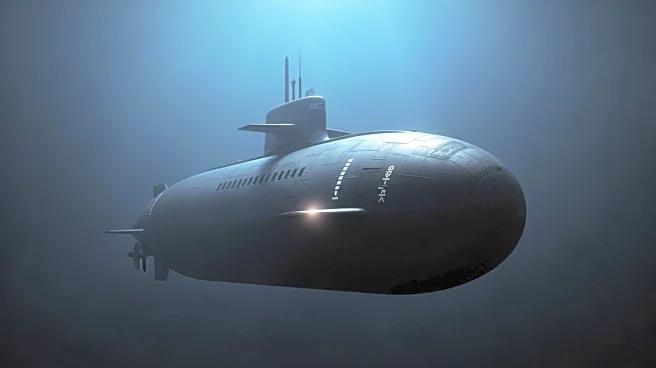What's Happening?
Russian President Vladimir Putin has announced the successful test of the Poseidon nuclear torpedo, a weapon capable of creating massive radioactive tsunamis. The test was conducted from a submarine and
is described as a significant achievement by Putin. The Poseidon torpedo is reportedly capable of carrying a 2 megaton warhead, which is over 150 times more powerful than the atomic bomb dropped on Hiroshima. This development follows Russia's recent test of the Burevestnik cruise missile, another advanced nuclear weapon. The Poseidon and Burevestnik projects were initiated in response to the U.S. withdrawal from the 1972 Anti-Ballistic Missile Treaty and NATO's expansion.
Why It's Important?
The successful test of the Poseidon nuclear torpedo underscores the ongoing arms race and strategic tensions between major global powers. This development could potentially alter the balance of power, as the weapon's destructive capability poses a significant threat to coastal cities. The announcement may escalate geopolitical tensions, particularly with the United States and NATO, as it highlights Russia's advancing military capabilities. The test also raises concerns about nuclear proliferation and the potential for increased military confrontations.
What's Next?
The international community is likely to respond with heightened diplomatic and military vigilance. The U.S. and NATO may consider bolstering their own defense systems or engaging in diplomatic efforts to address the growing threat. Additionally, there may be calls for renewed arms control negotiations to prevent further escalation. Russia's continued development and testing of advanced nuclear weapons could lead to increased sanctions or other diplomatic measures from Western nations.
Beyond the Headlines
The test of the Poseidon torpedo raises ethical and environmental concerns, particularly regarding the potential impact of radioactive tsunamis on marine ecosystems and coastal populations. The development of such weapons also prompts discussions about the morality of nuclear deterrence and the risks associated with maintaining large arsenals of advanced nuclear weapons. Long-term, this could influence global disarmament efforts and the international community's approach to nuclear non-proliferation.









